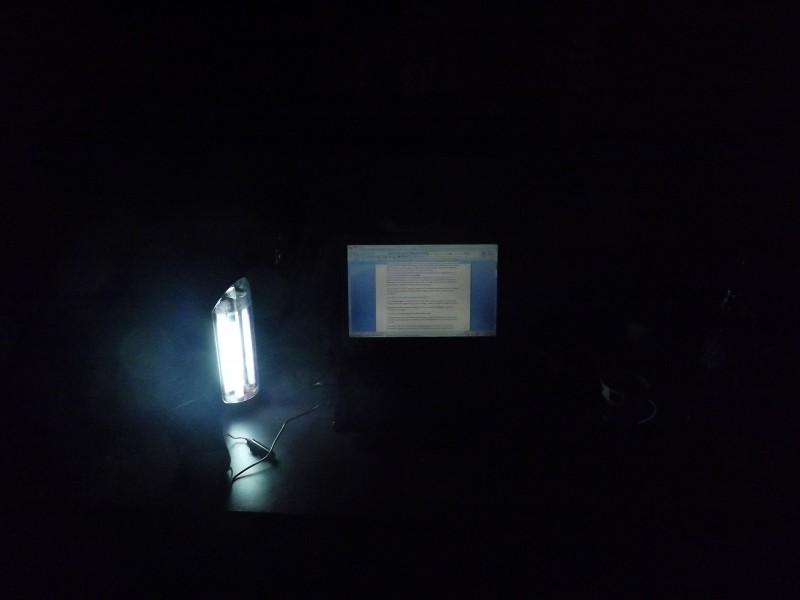
Writing the article during one of the power outages. Egyptians continue to suffer from power outages, with some areas experiencing up to 20 hours without power.
The frequency of power outages has risen dramatically in Egypt over the past few days, causing frustration among Egyptians, with some areas experiencing blackouts of about 20 hours. Contradicting statements have been issued by government officials regarding the cause of this increase.
The head of the Egyptian Electric Utility and Consumer Protection Regulatory Agency (EgyptERA), in an interview with Daily News Egypt, said that the main cause of the problem was a “deficit in the fuel supply.” An official from the Ministry of Petroleum has denied accusations that the fuel supplied does not meet the proper standards, an issue that was raised by another official from the Ministry of Electricity. Prime Minister Ibrahim Mahlab pointed to ‘saboteurs’ for being a partial cause for the increase in outages – indirectly suggesting that the Muslim Brotherhood, an Islamist organization, and its supporters have been damaging power lines and stations.
Egypt's current government has labeled the Muslim Brotherhood a terrorist organization and accused it of carrying out attacks against police and civilians. The country's first democratically elected president, Mohamed Morsi, who is a member of the Brotherhood, was ousted in a military coup last year led by the head of the Egyptian Armed Forces Abdel Fattah El Sisi, who later became president. Authorities launched a bloody crackdown against the group afterward.
The government’s claim that ‘saboteurs’ are behind the outages regarding the power outages has sparked ridicule on social media. Egyptian journalist Nadia el-Magd posted this tweet in response to those accusations:
الاهرام الكهرباء: العجز فى إنتاج الطاقة يبلغ ذروته اليوم ويقترب من 6000 ميجا … عجز الانقلاب … الاخوان برده ؟ : )
— Nadia el-Magd ناديا (@Nadiaglory) agosto 18, 2014
“Al-Ahram [Newspaper]: Electricity [Ministry]: The shortage in electricity production reaches its peak today and nears 6,000 mega[watts]. The coup’s shortage … And still, [they blame] the Brotherhood?”
Nawara Negm, Egyptian activist and daughter of the late poet Ahmed Fouad Negm, tweeted her reactions to the accusation.
وناس بترد عليا تقولي الاخوان هم اللي بيقطعوا الكهربا! والله؟ طب حيث كده نرجع الاخوان عشان يرجعوا لنا الكهربا
— فاقد الشيء لا يؤذيه (@nawaranegm) agosto 19, 2014
“And people respond to me and tell me that the [members of the] Brotherhood are the ones who are cutting the electricity! By God? Then if that is so, bring back the Brotherhood so they can bring back the electricity.”
In a sarcastic reference to ousted President Muhammed Morsi’s statement blaming an individual for receiving 20 Egyptian pounds to leave the on-off electricity lever down, Negm said:
الواد بتاع العشين جني الاخوان بقوا يدوله شهرية 1200 جني حتة واحدة… عشان كده متوصي
— فاقد الشيء لا يؤذيه (@nawaranegm) agosto 19, 2014
The boy who took 20 Egyptian pounds, the Brotherhood is now giving him 1,200 pounds monthly.
Political activists have also criticized the media’s handling of the issue, comparing it with the way it has handled the same matter during the Morsi presidency. Revolutionary youth group April 6 used the media’s focus on the problems faced by hospitals during Morsi’s presidency to make that comparison:
نشكر الأطفال اللى كانوا بيموتوا فى الحضّانات لما الكهرباء بتقطع مرة فى اليوم ودلوقتي صامدين برغم إنها بتيجي مرة فى اليوم #الكهرباء_قاطعة
— A6Mحركة شباب 6 أبريل (@shabab6april) agosto 18, 2014
We thank the children who used to die in the incubators when the electricity was cut once a day and are now steadfast despite [electricity] coming on once a day. #electicity_is_cut
During Morsi’s time in office, the media focused much attention on the problems facing the incubators at hospitals during power outages and blamed the government then for the failure. Today, television hosts have largely remained silent about the same problem or have blamed the Muslim Brotherhood for the outages.
Egyptian Prime Minister Ibrahim Mahlab made another statement regarding the energy crisis, claiming that Egypt’s electricity management system is the best in the world. Egyptians also took to social media to criticize the statement.
Egyptian TV show host Mahmoud Saad tweeted:
محمود سعد : الكهربا بتقطع بال 7 و ال 8 ساعات .. ايه معنى ان رئيس الوزرا يطلع يقول عندنا احسن منظومه كهرباء فى العالم
— محمود سعد (@Akhralnahar) agosto 16, 2014
Electricity gets cut for 7-8 hours .. How can the prime minister say that we have the best electric power system in the world?
A recent article by Egyptian newspaper AlMasry AlYoum has also sparked criticism at the government’s handling of the issue. According to the article, favoritism has resulted in the redistribution of power cuts, leaving approximately 60 percent of the country dealing with power outages. Out of the remaining 40 percent, only 10 percent of the buildings that are labeled to be power-cut-free are those related to security, police stations, hospitals, and water and sewage stations.
Political activist and former member of parliament Mostafa Alnagar expressed his disappointment:
من البؤس اللى وصلنا ليه فى قطع الكهرباء المستمر بقى طلب الناس دلوقتى المساواة فى قطع الكهرباء لان فى مناطق الكهرباء مش بتقطع فيها نهائيا
— Mostafa Alnagar (@alnagar80) agosto 19, 2014
“From the misery we have reached regarding continuous power cuts, the people’s demand now has become equality in power cuts because there are areas in which power is not cut at all.”
An ask.fm user posted a message to award-winning Egyptian blogger Wael Abbas:
I live in a military residential compound at Rabaa Al-Adawiya. Electricity doesn’t get cut.
Abbas’ reply was merely a period.
Power outages have occurred for years in Egypt, yet the rate at which they have been occurring has increased. With an ailing economy, the current system has a major challenge to face to fulfill the needs of the people and the demands that Morsi failed to fulfill.






